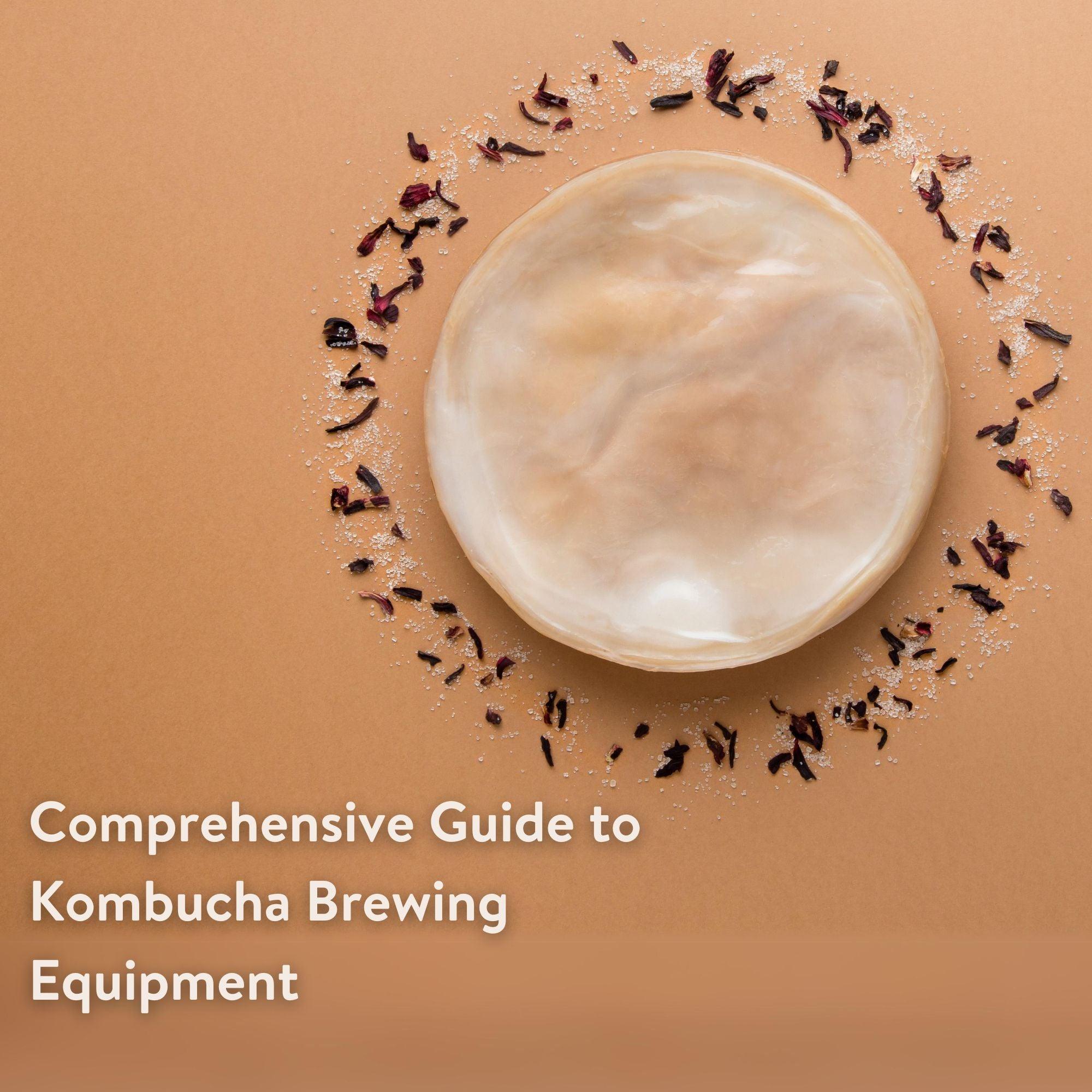Introduction
Water kefir, a naturally effervescent beverage teeming with probiotics, has become a favorite among health enthusiasts. Let's delve into the fascinating world of water kefir, exploring its history, health benefits, and the simple ways you can make it at home.
What is Water Kefir?
Water kefir is a fermented beverage made from sugar water, water kefir grains, and sometimes fruit juice or additional flavors. It's a dairy-free alternative to traditional milk kefir and offers similar probiotic benefits.
Importance of Probiotics in Health
Probiotics, the friendly bacteria that reside in our gut, play a vital role in digestion, immune function, and overall well-being1. From enhancing nutrient absorption to combating harmful pathogens, these microscopic warriors are an essential part of a healthy diet.
A Brief History of Water Kefir
Water kefir's roots trace back to Mexico, where the local sugary water fermented with grains became a popular traditional drink. Its journey across continents has led to various local adaptations, reflecting diverse cultures and tastes.
Understanding Water Kefir
Water kefir grains are a symbiotic culture of bacteria and yeast (SCOBY). These grains are a combination of friendly bacteria and yeast held together by polysaccharides. They work in harmony to ferment sugar water, creating a drink that's both delicious and nutritious.
Components of Water Kefir Grains
Water kefir grains contain a variety of bacteria and yeast, such as:
- Bacteria: Lactobacillus, Streptococcus, Pseudomonas, among others
- Yeast: Saccharomyces, Candida, Hanseniaospora, etc.
These components contribute to the fermentation process and the resulting health benefits.
Fermentation Process
The fermentation process of water kefir is both fascinating and straightforward:
- Mixing Ingredients: Combine 1/4 cup of high-quality cane sugar with a liter of water at room temperature.
- Adding Grains: Introduce the water kefir grains to the sugar water.
- Fermenting: Allow the mixture to ferment for 24 hours.
- Straining and Flavoring: Remove the grains and add desired flavorings.
Probiotic Strains
Water kefir is rich in probiotic strains, each with unique characteristics and health benefits. Here's a list of some common strains:
- Lactobacillus brevis: Helps in digesting complex carbohydrates; good for gut health.
- Leuconostoc mesenteroides: Aids in fermentation; known for anti-inflammatory properties.
- Saccharomyces cerevisiae: Boosts immunity and aids digestion.
- Acetobacter fabarum: Involved in producing acetic acid, helping in metabolism.
- Streptococcus thermophilus: Supports lactose digestion, useful for lactose-intolerant individuals.
These strains work together to create a symbiotic environment that offers a variety of health benefits. Further research on these strains can be found in scientific literature [4].
Difference between Water Kefir and Milk Kefir
| Aspect | Water Kefir | Milk Kefir |
|---|---|---|
| Base Ingredients | Sugar water | Organic milk |
| Taste | Light, refreshing | Creamy, tangy |
| Lactose Content | Dairy-free | Contains lactose |
| Fermentation Time | 24 hours | 24 to 36 hours |
| Probiotic Composition | Varied strains | Similar but varied |
Difference between Water Kefir and Kombucha
| Feature | Water Kefir | Kombucha |
|---|---|---|
| Base | Sugar water | Tea and sugar |
| Fermentation Time | 24 hours | 7-20 days |
| Probiotic Strains | Various as listed | Different strains |
| Flavor | Variable | Tangy, tea-like |
| Caffeine Content | None | Contains caffeine |
By exploring these areas in depth, we can see why water kefir has become a popular choice among health-conscious consumers, offering both delightful flavors and substantial health benefits.
Health Benefits of Water Kefir
Water kefir's health benefits extend beyond digestion and immune support:
- Digestive Health: Improves gut flora, aids digestion, and alleviates constipation [2].
- Immune System Support: Boosts immunity through gut-health improvement [3].
- Potential Weight Loss Aid: Low-calorie, a natural alternative to sugary beverages.
- Skin Health: May improve skin quality by impacting gut health positively.
- Bone Health: Some studies suggest that kefir might improve bone health by increasing calcium absorption.
- Mental Health: Emerging research indicates a connection between gut health and mood regulation.
How to Make Water Kefir at Home
Equipment Needed
- Glass jar
- Plastic or wooden spoon
- Fine-mesh strainer
- Bottles for storing
Ingredients
- 1/4 cup cane sugar
- 1 liter of water
- Premium quality water kefir grains
Step-by-Step Brewing Guide
- Dissolve Sugar: In a glass jar, dissolve cane sugar in water at room temperature.
- Add Grains: Introduce water kefir grains.
- Cover: Cover the jar with a cloth.
- Ferment: Allow fermenting for 24 hours.
- Strain: Remove grains using a fine-mesh strainer.
- Flavor: Add desired flavorings like fruit juice or herbs.
- Bottle: Transfer to bottles and refrigerate.
-
Enjoy: Enjoy your homemade water kefir drink!
Flavoring and Customizing
Experiment with various flavorings like fresh fruit, herbs, or even coconut water kefir. Your creativity is the only limit!
Troubleshooting Common Problems
- Overfermentation: Reduce fermentation time; keep at room temperature.
- Grain Health: Regularly rinse with non-chlorinated water.
- Flavor Issues: Experiment with various flavoring agents and combinations.
- Fermentation Not Starting: Check water kefir grains for quality and temperature.
Simple Water Kefir Flavoring Options
Water kefir offers endless flavor possibilities:
- Citrus Burst: Add lemon, lime, or orange slices.
- Tropical Twist: Incorporate pineapple and coconut water.
- Berry Delight: Blend with fresh or frozen berries.
- Herbal Infusion: Try mint, basil, or rosemary.
- Spicy Notes: Experiment with ginger or cinnamon.
Flavors can be mixed and matched to create unique taste profiles.
Create delightful recipes using water kefir as a base, such as kefir smoothies, cocktails, or even salad dressings. Let your culinary creativity shine!
FAQs
-
What does water kefir taste like? - Water kefir has a refreshing and slightly tangy taste, similar to a light lemonade. By adding different fruits or flavorings, the taste can be customized to your preference. Its effervescence adds a pleasing sparkle to the drink.
-
Can I use any type of sugar? - It's best to use cane sugar or other high-quality sugars to ensure proper fermentation. Highly refined sugars might lack the necessary minerals and nutrients for the bacteria and yeast to thrive. Organic sugars or coconut sugar are also viable options.
-
Is water kefir suitable for lactose-intolerant individuals? - Yes, water kefir is a dairy-free alternative, making it perfect for those with lactose intolerance. It offers a way to enjoy probiotic benefits without the worry of dairy-related digestion issues.
-
How long does homemade water kefir last? - When stored properly in the refrigerator, water kefir can last up to a week. Its taste might change slightly over time, becoming more tangy, but this doesn’t affect its health benefits.
-
Can children drink water kefir? - Water kefir can be a nutritious drink for children, introducing them to probiotics at a young age. However, it's always advisable to serve in moderation and consult with a pediatrician if you have any concerns.
-
Is water kefir alcoholic? - Water kefir can contain minimal amounts of alcohol due to fermentation, usually less than 1%. This level is generally considered non-alcoholic, but it’s something to be aware of if avoiding alcohol completely.
-
How often should I consume water kefir for health benefits? - Consumption may vary based on individual needs and health goals. Some people enjoy it daily, while others prefer a few times a week. Consulting with a healthcare provider or nutritionist can help determine what’s best for you.
-
Where can I buy water kefir grains? - Water kefir grains are available at both online retailers and local health stores. Look for premium quality grains from reputable sources to ensure a successful fermentation process.
-
Can water kefir grains be reused? - Yes, with proper care, water kefir grains can be reused multiple times. They may even multiply, allowing you to share with friends or experiment with flavors. Following the right process ensures their continuous benefits.
-
What is the difference between water kefir and kombucha? - While both are fermented beverages, they differ in base ingredients, fermentation time, probiotic strains, flavor, and caffeine content. Water kefir is generally quicker to ferment and has a milder flavor.
Conclusion
Water kefir, with its versatile flavors and wealth of health benefits, is a welcome addition to any health-conscious diet. Try making it at home and enjoy the delightful journey of fermentation, taste exploration, and wellness.



